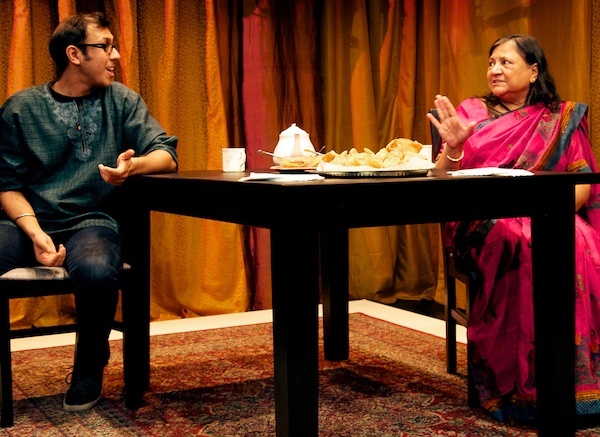Theater Review: “A Brimful of Asha” — Trying to Bridge the Generation Gap
By Erik Nikander
The conversation between Ravi and his mother is funny, engaging, and often illuminating; their real-life bond is palpable as the pair try to reconcile the young man’s hopes and dreams with his Indian heritage.
A Brimful of Asha, written and performed by Ravi Jain and Asha Jain. Directed by Ravi Jain. The Why Not Theatre staging streamed by Arts Emerson, on-demand from March 9 at 7:30 p.m. EST through March 22 at 10 p.m. EST.

Ravi Jain and Asha Jain in a scene from A Brimful of Asha. Photo: Erin Brubacher
When it comes to resolving conflicts, different families favor different methods. For instance, when Canadian theater artist Ravi Jain and his mother Asha clashed over Ravi’s reluctance to settle down and get married, they decided to write a play about it. So it makes sense that the script is less a traditional drama than a mother-son storytelling session — presented live on stage. And the conversation between Ravi and his mother is funny, engaging, and often illuminating; their real-life bond is palpable as the pair try to reconcile the young man’s hopes and dreams with his Indian heritage. The conflict is worth exploring, but the play’s awkward structure sometimes gets in the way.
Presented by ArtsEmerson and originally produced by Toronto’s Why Not Theatre in 2014, A Brimful of Asha begins by chronicling Ravi’s family history, capped by the son’s life as a scrappy young actor with a newly earned degree in theater. He’s doing all he can to make the necessary connections and find employment as an artist, but there are two critics he can’t win over — his parents. They’re baffled by their son’s insistence on stage work instead of taking a respectable job in the family business they’d spent their lives building. Ravi’s lack of interest in marriage also sparks considerable friction. Over the course of a trip across India, Ravi’s patience with his parents’ efforts to set him up with someone — anyone! — wears increasingly thin.
It’s easy to sympathize with Ravi’s tricky situation. Who wants to be forced into a romantic entanglement? Of course, turning down a potential partner also means disappointing his parents — something Asha is not shy of pointing out to him. Though Asha isn’t a professional actor and she makes no effort to hide that fact, she nonetheless has a natural presence on stage, and she expresses herself with straightforward honesty. We can also tell in an instant that she takes her Indian heritage seriously. She reminds Ravi his happiness isn’t the only thing at stake — to the broader culture, his never-ending bachelorhood reflects badly on her as a mother. Asha’s Indian cultural ties may be crucial to her life, but Ravi is hyperfocused on his need to find himself as an artist and an individual.
Generational divides are tough to bridge, and the one depicted in A Brimful of Asha is especially thorny. Given this challenge, it makes sense that the play’s conflict isn’t entirely resolved, though that doesn’t mean the lack of closure isn’t frustrating. The arguments Ravi and Asha recreate may have occurred years ago, but it’s clear that the underlying tensions haven’t gone away. Ravi still isn’t hitched, and Asha still hopes that her matchmaking efforts will eventually pay off. That puts the audience in a bit of an awkward spot — we’ve been thrust into the middle of an ongoing family conflict! This unease is only accentuated by the weird pacing of the play’s final section. Things seem to be wrapping up nicely, but then the tension ramps back up again when Ravi is drawn (again!) into his parents’ efforts to get him married. There’s no catharsis here — just a short recess before we’re thrown back into the domestic thicket.
Other moments in the play also strike a strange tone, such as when mother and son launch into a screaming match and Ravi spews a stream of expletives at Asha, berating her for trying to control his life. The sudden blast of profanity feels uncomfortable (it’s no fun to watch somebody curse out their mom, even if it is all staged). It is also oddly inauthentic; the scene feels as if it’s trying too hard to be extreme and shocking. Another potentially resonant episode is spoiled by the technical presentation: after a heated argument, Ravi and Asha have an emotional phone call, but most of what’s being said is impossible to decipher because of the fuzzy audio. This is an especially stinging omission because this particular exchange might have given us deeper insight into how these two relate to each other.
The script at times delivers the emotional goods, particularly when it doesn’t focus so tightly on its central mother-son arguments. It excels at creating a sense of madcap comedy when it takes us through the matchmaking chaos Ravi is caught up in. It can also supply self-reflection, such as when Asha delivers a powerful monologue in which she tells the story of her own youthful dreams and her early days in Canada, an exciting and frightening time when she started a new life with a husband she barely knew. Ultimately, however, the issue of virtual versus live theater must be reckoned with. The staging would have benefited considerably from being seen in person. No disrespect to the power of virtual productions, but a play that centers on family members feuding about performance and tradition demands a presentation that’s up close and personal. A Brimful of Asha is compelling and entertaining, but as drama it ends up feeling as unsatisfactory as an unfinished argument.
Erik Nikander is a critic, playwright, and filmmaker based in the New England area. His film criticism can be read on Medium and his video reviews on a variety of topics can be viewed on Youtube at EWN Reviews.
Tagged: A Brimful of Asha, Arts Emerson, Asha Jain, Erik Nikander
